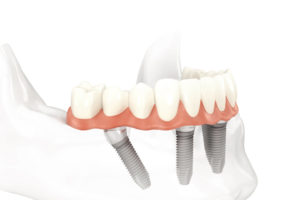Implantology has ferried the patient todentistry without pain and with reduced times, but to maintain maximum transparency towards our patients, we will illustrate in this article what could be the side effects of an intervention.
Implantology: why side effects are reduced
The side effects that may occur following an implant surgery are still mild and do not involve any complication because upstream there is a particular attention to the reduction of pain during the surgical phase.
What makes an implant operation pain-free is the combination of the dentist’s experience and sophisticated technological tools.

In particular, state-of-the-art equipment such as the TAC Cone Beam allows the dentist to know the patient’s anatomy in detail. Thanks to 3D digital reconstruction it can obtain information on bone height, width and thickness.
A precious heritage of data that guarantees the patient an intervention without trauma. In fact, starting from the three-dimensional images, the dentist will be able to plan every phase of the insertion of the plants up to its smallest detail.
Implant surgery planning minimizes the invasiveness of the surgery
The main source of pain is not given by the insertion of the implants in the bone, but by possible operations on the soft tissues, in particular on the gingiva. Thanks to innovative technological tools the intervention on the gingiva, during implantology, is minimized thus eliminating the unpleasant sensation of pain.
Added to this is the possibility of having conscious sedation, a type of anesthesia that reduces sensitivity to pain and generates a condition of relaxation in the patient.
These features make implantology accessible even to odontophobics.
Side effects of implantology
Implantology is an intervention and for correctness of information it is necessary to say that there could be side effects.
In fact, some patients may experience the following side effects during the post-surgery phase:
Cold sores
Cold sores could be the consequence of the stress condition the mouth is subjected to during surgery.

Edema
It is actually one of the rarest side effects. This is the appearance of ecchymoses or purple spots in the area affected by the operation. Antiedemic drugs are usually administered to prevent the appearance of edema.
Paresthesia
This is a temporary loss of sensitivity in the part affected by the intervention. A condition that disappears after a couple of days from implantology.
Tissue injury
Some patients may notice small lesions or ulcers on the soft tissues of the mouth. Also in this case it is the body’s response to a stress condition. Small lesions or ulcers can be treated with specific drug therapies.
As it is easy to deduce, they are all minor side effects that do not bring particular concerns to the patient.
Within a few days of implant surgery, any situation of discomfort will completely vanish, leaving only a new smile.















